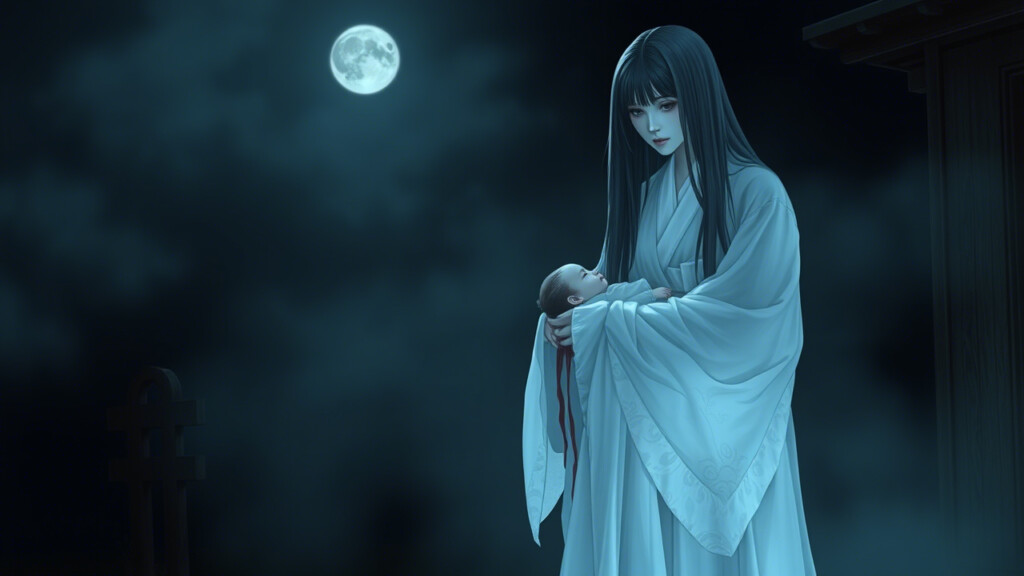In Japanese culture, death is not an end but a transition into another dimension. Ubume embodies the souls of mothers who died during childbirth, a sorrowful entity trapped between two worlds. The image of a woman cradling a child in her arms reflects the anguish of a spirit unable to fulfill its maternal duty.

The Origins of Ubume
A well-documented tale from Yokai.com describes how, in ancient society, the fear of dying during childbirth loomed heavily over women. Limited medical resources made the boundary between life and death more fragile than ever. Mothers who perished at the very moment they should have welcomed their child carried deep sorrow, preventing their souls from finding peace. They became Ubume, trapped between two realms, unable to leave the mortal world due to their lingering maternal love.
Appearance and Characteristics of Ubume
Ubume is draped in a tattered kimono, her long, unkempt hair cascading over a gaunt, hollow face. In her frail arms, she clutches a baby—a sight both heartbreaking and unnerving. Some eerie tales whisper that when a kind-hearted stranger agrees to hold the infant, they recoil in horror upon realizing that what they cradle is nothing more than a frigid stone or an empty bundle of cloth.
At night, her shadow flickers through the darkness, drifting like mist, accompanied by mournful cries—pleas for aid, desperate to soothe her helpless child. Her presence lingers with an unbearable sorrow, her hollow gaze brimming with agony that knows no release.
Folklore and Stories of Ubume
In various regions of Japan, people whisper about places where faint cries echo through the midnight air, yet when they search, only mist lingers in the emptiness.
One tale speaks of a mysterious woman appearing at night, asking a stranger to buy something for her child. However, when they return, they find nothing but a silent alleyway, and the coins they received have transformed into dry leaves or small pebbles.
Such eerie stories further deepen the tragic and mystical presence of Ubume in Japanese folklore.
Cultural and Spiritual Significance
While Ubume is often associated with ghostly legends, at its core, it represents the tragedy of mothers who died before they could fulfill their role. In the past, inadequate medical care deprived many women of the chance to raise their children, leaving behind sorrowful tales passed down through generations.
In Japanese Buddhism, spirits like Ubume, whose souls are unable to move on, remain trapped in the human world due to their lingering attachments. Rituals are performed to help them find peace, release their grief, and break free from their earthly bonds so they may continue their journey through Samsara and reach the afterlife.
Ubume – A Tragic Figure in Japanese Folklore
The legend of Ubume not only reflects supernatural fears but also reveals a painful reality of the past. These stories, retold across generations, contribute to the rich and mysterious spiritual landscape of Japan.
